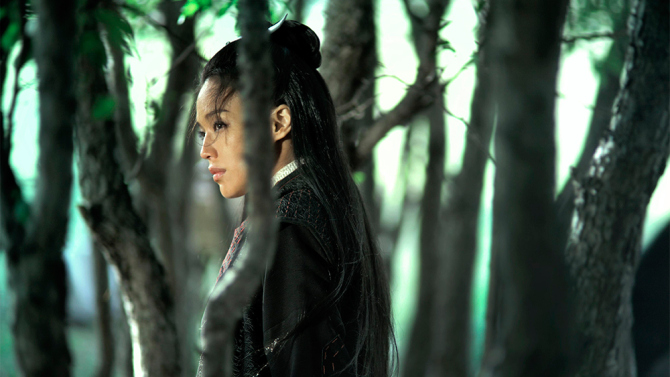Legendary Taiwanese director Hou Hsiao-hsien (Millennium Mambo) is first and foremost a contemplative stylist, the idea of applying his kind of formalism to the wuxia genre is fascinating, and as ever, Hou’s execution is faultless, but martial arts fans are bound to feel perpetually cold-shouldered.
Hou is a critical darling, and his best works – Millennium Mambo, Café Lumière, Three Times – have brought him deserved Ozu comparisons (the aforementioned Café Lumière is a deliberate homage).
Bearing this in mind it could be that part of the recent critical free-for-all over The Assassin at Cannes, where it won the Best Director Award, is due to the fact that Hou’s been absent from filmmaking for close to eight years.
For much of The Assassin feels like contrivance, maybe even pretentiousness, as Hou repeatedly refuses to give the audience what it wants to see when watching a martial arts film; action. But when did Hou ever deliberately tried to appeal to a populist audience?
Set during the 9th-century Tang Dynasty, in China, The Assassin tells the story of Nie Yinniang (Hou regular, Shu Qi), the titular assassin, ordered to execute her betrothed, Lord Tian (Chang Chen).
Admittedly, it’s lovely to see Hou reunited with his muse, Hong Kong superstar Shu Qi as well as his long-time cinematographer Mark Lee Pin-bing. Together they’ve certainly constructed a handsome body of work, one overfull with languid, exacting dramas where shots are held for lengthy periods, allowing restless long takes of landscapes and exquisitely lit set pieces to overpower the frame.
But does these artistic embellishments result in a rewarding wuxia? It most likely will feel elitist and alienating for the average cinemagoer. Hou’s use of the antiquated four-by-three aspect ratio doesn’t in any way cheapen the palatial breadth of vision, the rich period details, or the compelling characters.
Many tactile moments are sublimely surrendered and aching in their symmetry, and yet fight scenes erupt quickly, are graceful and well choreographed, but glimpsed in artful shadow or disaffected distances, barely on the periphery before they are shown no more. For some, it’s a fine line between mesmerizing and somnambulistic, The Assassin effaces such distinctions.
Sumptuous though it may be, The Assassin doesn’t finish the mark as an action film reclaimed. It’s too reflective and glacially paced to placate many but the most aberrant Hou heads, everyone else will wonder why the action scenes were so truncated, the one scene of sorcery, so nugatory, and the overall experience, ravishing yet ultimately unresponsive.
Taste of Cinema Rating: 3.5 stars (out of 5)
